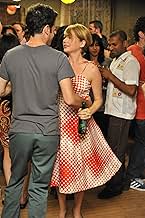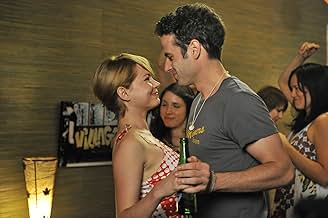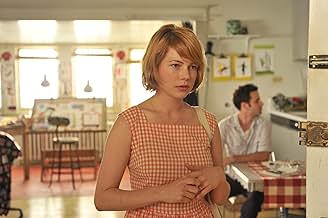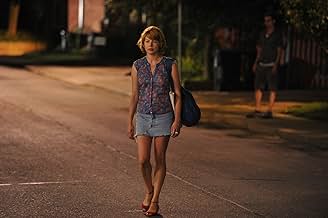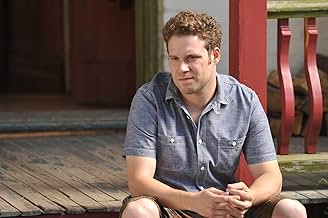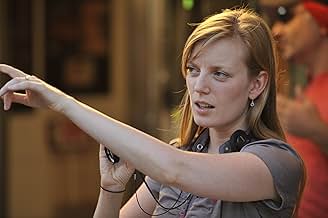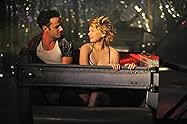VALUTAZIONE IMDb
6,5/10
30.958
LA TUA VALUTAZIONE
Una donna felicemente sposata si innamora dell'artista che vive dall'altra parte della strada.Una donna felicemente sposata si innamora dell'artista che vive dall'altra parte della strada.Una donna felicemente sposata si innamora dell'artista che vive dall'altra parte della strada.
- Regia
- Sceneggiatura
- Star
- Premi
- 3 vittorie e 19 candidature totali
Vanessa Carter
- Tony
- (as Vanessa Coelho)
Ciarán MacGillivray
- Soldier
- (as Ciaran MacGillivray)
Recensioni in evidenza
OK it's not as bad as all that -- it is sort-of OK -- but I had to say it. I'm probably not the first.
This is basically a short film on infidelity, dragged out to a couple of hours. It's not terrible, but it's also not good.
The film has its good points, of course. I found the cinematography to be great, for example. Particularly the shots in and around water were very effective, and showcase the use of film to communicate without words. But the fact that I'm noticing the cinematography first tells you that the story isn't really there.
I thought the acting was believable. Everyone performed well in their roles, as far as I can tell. Seth, Luke, and Michelle were good choices for the triangle. That said, I am confused about casting not just one but two popular comedians against type. It made me question what I was supposed to be seeing. I'm not sure I figured it out.
For me I attribute the problems to editing and writing.
The story didn't provide anyone for me to root for, identify with, or even hate. I didn't really care for any of the characters. I like these actors, but I found these characters annoying to varying degrees, but not so annoying as to be detestable. I just didn't wish to spend any more time with any of them than I had to. Perhaps if I could recognize in them any motivation for their actions (or lack thereof) it might be different. I compare this with The Postman Always Rings Twice, where understandable things happen, and lead to a more satisfying (but too preachy-perfect) ending.
The long silences here are not deep and meaningful. They're just long. I figure the film could be cut by half an hour, and not lose much beyond silence or small talk. In fact, even the end could be lopped off. There were several points where I thought it was over, but it kept going. What's odd is that there are some scenes where random half-second cuts are made, music-video-style, but real cuts to speed it along aren't made. I'm certain you could cut another hour or so and turn it into a really great short. There's nothing wrong with that, if telling the story with emotion is the goal.
The tie-in to Leonard Cohen's song seemed forced. I cringed. When I think about that scene, it feels to me like someone decided we needed a cryptic song by a Canadian poet to name the film after. I don't feel that any of the characters in the film are devoted Leonard Cohen fans.
Overall, I wouldn't recommend this film, but neither would I say to avoid it. It will surely be on the The Movie Network (among others) in Canada, since they apparently helped pay for it. The best place to see it is therefore probably cable or satellite.
This is basically a short film on infidelity, dragged out to a couple of hours. It's not terrible, but it's also not good.
The film has its good points, of course. I found the cinematography to be great, for example. Particularly the shots in and around water were very effective, and showcase the use of film to communicate without words. But the fact that I'm noticing the cinematography first tells you that the story isn't really there.
I thought the acting was believable. Everyone performed well in their roles, as far as I can tell. Seth, Luke, and Michelle were good choices for the triangle. That said, I am confused about casting not just one but two popular comedians against type. It made me question what I was supposed to be seeing. I'm not sure I figured it out.
For me I attribute the problems to editing and writing.
The story didn't provide anyone for me to root for, identify with, or even hate. I didn't really care for any of the characters. I like these actors, but I found these characters annoying to varying degrees, but not so annoying as to be detestable. I just didn't wish to spend any more time with any of them than I had to. Perhaps if I could recognize in them any motivation for their actions (or lack thereof) it might be different. I compare this with The Postman Always Rings Twice, where understandable things happen, and lead to a more satisfying (but too preachy-perfect) ending.
The long silences here are not deep and meaningful. They're just long. I figure the film could be cut by half an hour, and not lose much beyond silence or small talk. In fact, even the end could be lopped off. There were several points where I thought it was over, but it kept going. What's odd is that there are some scenes where random half-second cuts are made, music-video-style, but real cuts to speed it along aren't made. I'm certain you could cut another hour or so and turn it into a really great short. There's nothing wrong with that, if telling the story with emotion is the goal.
The tie-in to Leonard Cohen's song seemed forced. I cringed. When I think about that scene, it feels to me like someone decided we needed a cryptic song by a Canadian poet to name the film after. I don't feel that any of the characters in the film are devoted Leonard Cohen fans.
Overall, I wouldn't recommend this film, but neither would I say to avoid it. It will surely be on the The Movie Network (among others) in Canada, since they apparently helped pay for it. The best place to see it is therefore probably cable or satellite.
'I'm afraid of being in-between of things.' That's a beautiful line quoted by Margo from a film called 'Take this waltz'. Attracted by the title which reminded me of Leonard Cohen's song which turned out to be the same source at the first place, also the cast especially Michelle Williams that I find quite special, special in a way that her appearance seems to be fragrant because of how she looks like. I somehow believed that the character resembles a lot with her in real life. We all know her divorced co-star husband Heath Ledger died of an overdose accident, and they have a daughter named Mathilda. After his death she somehow emerges into a characterized actress. You can see her playing depressed wife, Marilyn Monroe, and this confused in-house freelance writer not knowing what to write about. It's all very well chosen with her characters. When I see the way she read out the lines, in a naturally performed way, there's a kind of magic and it must be coming from all what she experienced. Of course every actor's acting style comes from their own life and experience. Yet Michelle has this very sincere attitude of not disguising what went through in her spiritually and physically. Her nudity is not difficult to be found. Although a mother to daughter, her figure remains like a maid, pure and simple. It seems like having a child brings her nothing but growth, growth of innocence and courage of showing the real self inside of her.
The film involves a freelance writer Margo who married to a cookbook author and they enjoyed leisure house life on a Portugal region in Toronto, Canada. The couple is happily engaged with their friends and natives. Parties are thrown every now and then. They sometimes argue, but generally leading a sweet and contented marriage till she encounters with a handsome guy at a tourism site. The magic connection drew on these two strangers. They both found each other very strangely familiar. And right at the first conversation they felt natural enough to joke each other and explain one's inner feelings. Together they make a couple of innocent child embarking on an intuitive sight of the world sparkling only in their eyes. It's fun and haunting, especially when it's found they're only neighbors across from street.
Yet the thrill of encounter only keeps in a very cautious way, which makes it all the more alluring. They interact in an extremely explicit and intimate verbal way to displace physical attraction. Imaginary stroking, kissing and intercourse touched their mind with fulfilled excitement. Every morning she followed him or vice versa to the beach, cafés and the swimming pool, where they swim like dolphins, getting near and dodging away. When he attempted to grab her ankle, the moment suddenly halted and she just left like that. She felt like the spell will be broken once the intimacy takes off to a further step. And she's still guarding herself from the fear of casting herself in the craziness of love affair.
The film involves a freelance writer Margo who married to a cookbook author and they enjoyed leisure house life on a Portugal region in Toronto, Canada. The couple is happily engaged with their friends and natives. Parties are thrown every now and then. They sometimes argue, but generally leading a sweet and contented marriage till she encounters with a handsome guy at a tourism site. The magic connection drew on these two strangers. They both found each other very strangely familiar. And right at the first conversation they felt natural enough to joke each other and explain one's inner feelings. Together they make a couple of innocent child embarking on an intuitive sight of the world sparkling only in their eyes. It's fun and haunting, especially when it's found they're only neighbors across from street.
Yet the thrill of encounter only keeps in a very cautious way, which makes it all the more alluring. They interact in an extremely explicit and intimate verbal way to displace physical attraction. Imaginary stroking, kissing and intercourse touched their mind with fulfilled excitement. Every morning she followed him or vice versa to the beach, cafés and the swimming pool, where they swim like dolphins, getting near and dodging away. When he attempted to grab her ankle, the moment suddenly halted and she just left like that. She felt like the spell will be broken once the intimacy takes off to a further step. And she's still guarding herself from the fear of casting herself in the craziness of love affair.
This film shouldn't work nearly as well as it does. Take This Waltz centres around a two-suitors plot that was tired a century ago, takes place in a hipster-utopia version of Toronto, has multiple comedic actors who've worn out their welcome doing Serious Roles, and its characters are either selfish or dull. But Take This Waltz also has a kind of magic that can wash over the most jaded cinema viewer and make you forget that you've seen it all before.
Maybe it's Sarah Polley's direction, or maybe it's the brilliant performance of Michelle Williams that makes her character likable against all odds. Maybe the thematic statement about the perils of looking for adventure and the need for constant romance is something that we need affirmed more often against the tide of romcoms and gooey melodramas. Maybe it's just that I really want to live in hipster- utopia-Toronto. But this film stuck with me for days afterwards, its scenes playing over and over in my mind, blotting out all the rest of the disposable entertainment. There are so many indelible images here: a public shower scene which plays pranks on the male gaze, that goofy but somehow powerful 360-degree-rotation montage, and of course the final scene, a coda that grants its central character and us along with her a moment of unmediated joy. And it's that joy that the film understands as being something we maybe have to pursue no matter what its cost. Michelle Williams' abashed smile gives us a taste of that adventure, and like the rest of the movie, it's damn hard to resist.
Maybe it's Sarah Polley's direction, or maybe it's the brilliant performance of Michelle Williams that makes her character likable against all odds. Maybe the thematic statement about the perils of looking for adventure and the need for constant romance is something that we need affirmed more often against the tide of romcoms and gooey melodramas. Maybe it's just that I really want to live in hipster- utopia-Toronto. But this film stuck with me for days afterwards, its scenes playing over and over in my mind, blotting out all the rest of the disposable entertainment. There are so many indelible images here: a public shower scene which plays pranks on the male gaze, that goofy but somehow powerful 360-degree-rotation montage, and of course the final scene, a coda that grants its central character and us along with her a moment of unmediated joy. And it's that joy that the film understands as being something we maybe have to pursue no matter what its cost. Michelle Williams' abashed smile gives us a taste of that adventure, and like the rest of the movie, it's damn hard to resist.
Sarah Polley proves her impressive directorial and screen writing debut, 2006's "Away from Her" starring a luminous, Oscar-nominated Julie Christie as an Alzheimer's patient, was no fluke with this incisive look at a most inchoate love triangle. With a title taken from Leonard Cohen's cultish song, this clear-eyed yet melancholic 2012 drama once again showcases Polley's prodigious acumen in capturing the complexity of adult relationships without casting blame or judgment on the parties involved. The focal point of the triangle is 28-year-old Margot, an aspiring writer from Toronto on an assignment in Nova Scotia to write the copy for a travel brochure on historic Louisbourg. There she meets Daniel, also from Toronto where he is a struggling artist and a rickshaw driver. An attraction is almost immediate but not consummated. When they fly home on the same plane, Margot discovers he lives just across the street from her, which complicates matters since she's been married for five years to Lou, a cookbook author specializing in chicken dishes. Their marriage is comfortable, and their interactions reflect a lived-in familiarity marked by cute practical jokes and quirky riffs of humor.
But what Margot sees in Daniel is something that's been missing in her life, a sexual spark that excites her, even though she dares not act upon it since she really does love Lou in spite of his foibles - including a certain apathy about their relationship that he thinks is perfectly normal. She could see spending the rest of her life with Lou, but she wonders if he is her soul-mate or whether it's worth the risk to find out if Daniel is really the one. Blinded by desires she had yet to tap in her marriage, Margot knows if she acts upon those feelings, there will come some point where she'll have to make a hard decision between Lou and Daniel. Michelle Williams captures Margot's inner conflict with palpable empathy as you see her character expose her thoughts in moments of quiet in which she is the harshest judge of her actions. It's a shining performance which compares favorably to her evocative Marilyn Monroe in "My Week with Marilyn". There is a deliberate vagueness to the two men. As Daniel, Luke Kirby ("Mambo Italiano") manages to convey the lure of "the other man" without coming across as despicable even though it's clear he wants her from afar. At the same time, it's clear that Margot and Daniel have little in common, and they make you wonder how sustainable their relationship could be.
Seth Rogen does something surprising in this film – he acts. He still doesn't stray that far away from his shaggy-dog comic persona, but he realistically shows how Lou's contentment and impassivity bring Margot both lasting security and unresolvable fear and longing. Similarly, Sarah Silverman makes her few scenes count as Lou's plainspoken sister Geraldine, who is married with two kids and an alcoholic just out of rehab, especially when she tells Margot what she thinks of her ultimate decision. That Polley can coax such fine dramatic work from Rogen and Silverman is a credit to her growing confidence as a filmmaker. As a native Canadian, she also presents Toronto as a setting with its own unique identity (versus other directors who use it as a double for New York or Chicago), and her cinematographer Luc Montpellier brings a lushness to the images that adds to the intoxication Margot is feeling. There are still flaws – the ramshackle pace adds to an already lengthy 116-minute running time, and the climactic time-lapse montage feels out- of-place for a film that had tread so lightly before. Regardless, this film should play on a double bill with David Lean's "Brief Encounter" to show how mores have evolved about infidelity over seventy years. Whatever the outcome may be, the bottom line is that there are no easy answers.
But what Margot sees in Daniel is something that's been missing in her life, a sexual spark that excites her, even though she dares not act upon it since she really does love Lou in spite of his foibles - including a certain apathy about their relationship that he thinks is perfectly normal. She could see spending the rest of her life with Lou, but she wonders if he is her soul-mate or whether it's worth the risk to find out if Daniel is really the one. Blinded by desires she had yet to tap in her marriage, Margot knows if she acts upon those feelings, there will come some point where she'll have to make a hard decision between Lou and Daniel. Michelle Williams captures Margot's inner conflict with palpable empathy as you see her character expose her thoughts in moments of quiet in which she is the harshest judge of her actions. It's a shining performance which compares favorably to her evocative Marilyn Monroe in "My Week with Marilyn". There is a deliberate vagueness to the two men. As Daniel, Luke Kirby ("Mambo Italiano") manages to convey the lure of "the other man" without coming across as despicable even though it's clear he wants her from afar. At the same time, it's clear that Margot and Daniel have little in common, and they make you wonder how sustainable their relationship could be.
Seth Rogen does something surprising in this film – he acts. He still doesn't stray that far away from his shaggy-dog comic persona, but he realistically shows how Lou's contentment and impassivity bring Margot both lasting security and unresolvable fear and longing. Similarly, Sarah Silverman makes her few scenes count as Lou's plainspoken sister Geraldine, who is married with two kids and an alcoholic just out of rehab, especially when she tells Margot what she thinks of her ultimate decision. That Polley can coax such fine dramatic work from Rogen and Silverman is a credit to her growing confidence as a filmmaker. As a native Canadian, she also presents Toronto as a setting with its own unique identity (versus other directors who use it as a double for New York or Chicago), and her cinematographer Luc Montpellier brings a lushness to the images that adds to the intoxication Margot is feeling. There are still flaws – the ramshackle pace adds to an already lengthy 116-minute running time, and the climactic time-lapse montage feels out- of-place for a film that had tread so lightly before. Regardless, this film should play on a double bill with David Lean's "Brief Encounter" to show how mores have evolved about infidelity over seventy years. Whatever the outcome may be, the bottom line is that there are no easy answers.
This movie was hauntingly real--subtle in its slow approach to the climax and it stays with you long after you have left the theater. All of the actors are wonderful and capturing the nuances of their characters. Sarah Polley does it again. The story, set in Toronto, captures the everyday life of Margot and Lou--and depicts their special relationship through the details of their special ways of communicating. It is not until the complexities of Margot's struggle between her love for Lou and her unyielding attraction to her neighbour, that you start to feel her personal struggle. The inevitable ending does not disappoint. Highly recommended.
Lo sapevi?
- QuizSarah Polley wrote the role of Lou for Seth Rogen.
- BlooperIn the beginning of the film a day passes by showing the relative movement of the sun - the light moving on the walls. The sun moves from west to east.
- ConnessioniFeatured in Great MoVie Mistakes (2013)
- Colonne sonoreGreen Mountain State
Written & Performed by Corinna Rose & The Rusty Horse Band
Used by permission of Corinna Rose & The Rusty Horse Band (SOCAN)
I più visti
Accedi per valutare e creare un elenco di titoli salvati per ottenere consigli personalizzati
Dettagli
- Data di uscita
- Paesi di origine
- Siti ufficiali
- Lingua
- Celebre anche come
- Triste canción de amor
- Luoghi delle riprese
- Louisbourg, Nuova Scozia, Canada(lighthouse)
- Aziende produttrici
- Vedi altri crediti dell’azienda su IMDbPro
Botteghino
- Lordo Stati Uniti e Canada
- 1.239.692 USD
- Fine settimana di apertura Stati Uniti e Canada
- 137.019 USD
- 1 lug 2012
- Lordo in tutto il mondo
- 4.965.950 USD
- Tempo di esecuzione1 ora 56 minuti
- Colore
- Mix di suoni
- Proporzioni
- 1.85 : 1
Contribuisci a questa pagina
Suggerisci una modifica o aggiungi i contenuti mancanti







